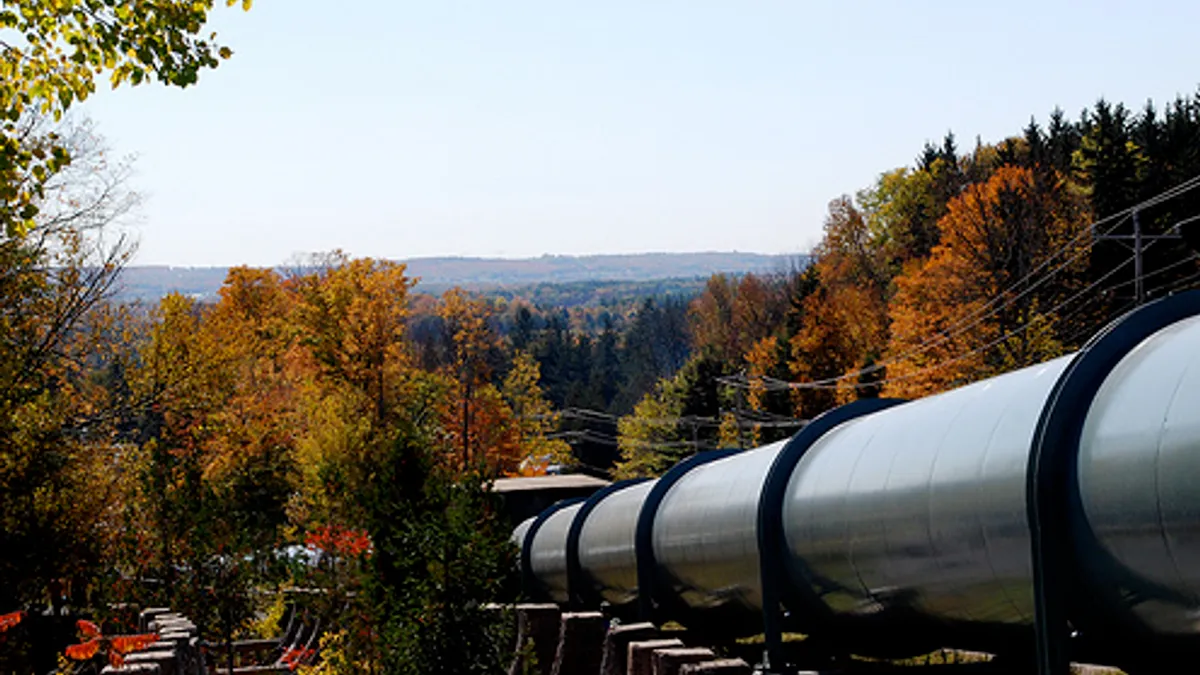Dive Brief:
- The U.S. Court of Appeals for the District of Columbia Circuit on Friday denied a bid from an environmental group to block pre-construction activities for the Mountain Valley Pipeline while the Federal Energy Regulatory Commission considers a rehearing on the project.
- Activist group Appalachian Voices asked the court to issue a stay on FERC's original October approval of the pipeline, arguing the agency can often take months to decide whether to have a rehearing, allowing pipeline companies to do damage to the environment and landowner property in the meantime.
- The D.C. Circuit ruled the group's concerns do not meet the standard needed to stay FERC's original decision. The three-judge panel also rejected a request from FERC to dismiss the case, referring those arguments to a new panel that will hear the merits of the pipeline project.
Dive Insight:
Early last month, Appalachian Voices filed a two-pronged challenge to Mountain Valley pre-construction activities, asking the D.C. Circuit to block them while FERC considers whether it will review an October decision to grant construction certification for the project.
At the center of the case are so-called tolling orders, issued by FERC to allow it more time to decide on rehearings or other issues. Appalachian Voices and other green groups say FERC regularly issues tolling orders with no end date, shielding its infrastructure decisions from judicial scrutiny.
"[S]ince 2009, FERC has issued a tolling order in 99% (74/75) of gas pipeline proceedings where a party requested rehearing," Appalachian Voices wrote in one filing. "On average, those tolling orders persisted for 194 days."
"During that time, courts were deprived of jurisdiction to review FERC orders — often until after construction was well under way or even complete (i.e., until the court could no longer prevent irreparable harm)," the group argued.
In some cases, Appalachian Voices wrote, FERC has taken more than 600 days to grant or deny a request for rehearing.
"During that period, petitioners are at the mercy of FERC while Mountain Valley (lawfully permitted or not) causes irreparable environmental harm, and takes and alters private property," the filing reads.
D.C. Circuit judges, however, sided with FERC, ruling without explanation that Appalachian Voices had "not satisfied the stringent requirements for a stay pending court review." They also rejected the group's second attempt to halt construction, writing that it had not proved its "clear and indisputable right" to a special legal writ that would have put the project on hold.
The order was not a slam dunk for FERC, however. The agency had requested that the case be dismissed, arguing that court challenges could not be brought against Mountain Valley until its final certification is in place — in other words, when the rehearing decision is made. Judges rejected that request as well, directing FERC to add its arguments to a second case on the merits of the pipeline.
Controversy over the timelines for pipeline construction is not confined to Mountain Valley. Last week, the D.C. Circuit refused to reconsider an August ruling that FERC had not properly accounted for the climate impacts of the 515-mile Sabal Trail Pipeline from Alabama to Florida. The court order means operation of the pipeline will likely stop at least temporarily, but large sections of it have already been built while the case worked its way through the court system.
Issues over tolling orders and climate analysis could come into play during FERC's upcoming review of pipeline approval policies, its first since 1999.













